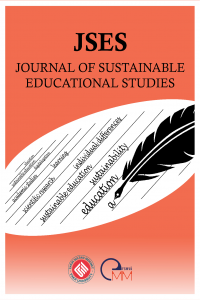Feminist Terapi Literatür Taraması
Son yıllarda kadınlar sosyal ve ekonomik yaşamda daha fazla yer almaya başlamasıyla birlikte çeşitli ortamlarda fırsat eşitsizlikleri ortaya çıkmaktadır. Feminist terapi, feminizm akımını temele almaktadır. Kaynağını halktan alması ve hiyerarşik ilişki olmaması terapinin en dikkat çekici noktalarından biri olmaktadır. Yapılan bu araştırma, feminist terapi ile ilgili literatürde yapılan araştırmaları derlemek amacıyla yapılmaktadır. Literatür taraması yapılırken Google Akademik üzerinden 2012-2022 yılları arasındaki uluslararası çalışmalar incelenmiştir. Konu ile ilgili literatür incelendiğinde araştırmaların 20 tanesinin doğrudan Feminist Terapi ile ilişkili olduğu görülmüştür. Çalışmalar arasında 14 makale psikoloji, 3 makale sağlık, 1 makale eğitim, 1 makale sosyal hizmet, 1 makale sosyoloji dergisinde yayımlanmıştır. 1 sosyoloji ve 1 sosyal hizmet alanındaki makale feminist terapi içeriğine rağmen alan dışı konulara değindiğinden göz ardı edilmiştir. Sağlık dergilerindeki makaleler ise, psikiyatri alanında yapıldığından dolayı çalışmaya dahil edilmiştir. Çalışmalar incelendiğinde 15 makalenin literatür taraması, 2 makalenin meta analiz ve 1 makalenin ise karma model kullanılarak yapıldığı görülmüştür.
Anahtar Kelimeler:
Feminist terapi, literatür taraması, makale
Keywords:
Feminist terapi; literatür taraması, makale,
___
- Akbary, S. H., Pascoe, L., & Wells, L. (2022). Community justice approaches for engaging and mobilizing men for violence prevention and the advancement of gender equality, diversity, justice, and inclusion: rapid evidence review. University of Calgary Faculty of Social Work, 1-35.
- Bondry K., & Schwantes, M. (2020). Clinical applications of feminist music therapy: An overview of the literature. Nordic Journal of Music Therapy, 30(2), 106-130. doi: 10.1080/08098131.2020.1753230
- Brown, L. S. (1994). Subyersive dialogues: Theory in feminist therapy. Basic.
- Brown, L. S. (2018). Feminist therapy. American Psychological Association.
- Budge, S. L., & Moradi, B. (2018). Attending to gender in psychotherapy: Understanding and incorporating systems of power. J. Clin. Psychol, 74, 2014-2027. doi: 10.1002/jclp.22686
- Büyüköztürk, Ş., Kılıç Çakmak, E., Akgün, Ö. E., Karadeniz, Ş., & Demirel, F. (2022). Eğitimde bilimsel araştırma yöntemleri. Pegem Akademi.
- Conlin, S. H. (2017). Feminist therapy: A brief integrative review of theory, empirical support, and call for new directions. Women's Studies International Forum, 62, 78-82. doi: 10.1016/j.wsif.2017.04.002
- Eagly, A. H., Eaton, A., Rose, S. M., Riger, S., & McHugh, M. C. (2012). Analysis of a half-century of research on women and gender. American Psychological Association, 67(3), 211-230. doi: 10.1037/a0027260
- Enns, C. Z. (2004). Feminist theories and feminist psychotherapies: Origins, themes, and diversity. Routledge.
- Gomez, J. M., Lewis, J. K., Noll, L. K., Smidt, A. M., & Birrell, P. J. (2016). Shifting the focus: non-pathologizing approaches to healing from betrayal trauma through an emphasis on relational car. Journal of Trauma & Dissociation, 17(2), 165-185. doi: 10.1080/15299732.2016.1103104
- Hay, P. J., Claudino, A. M., & Elbaky, A. (2015). Individual psychological therapy in the outpatient treatment of adults with anorexia nervosa (Review). Cochrane Library, 7, 1-72. doi: 10.1002/14651858.CD003909.pub2.
- Hill, M. (1990). On creating a theory of feminist therapy. Women & therapy, 9(1-2), 53-65.
- Hyde J. S., & Mezulis A. H. (2020). Gender differences in depression: biological, affective, cognitive, and sociocultural factors. Harvard Review of Psychiatr, 28(1), 1-13. doi: 10.1097/HRP.0000000000000230
- Jeona, M. (2015). Incorporating feminism into rehabilitation counselor education. Rehabilitation Research, Policy, And Education, 29(1), 47-57. doi: 10.1891/2168-6653.29.1.47
- Mantehi, R. (2012). Counsellors’ choice of a preffered therapy as autobiography. New Zeland Journal of Counselling, 32(1), 1-11.
- Knebel, L. (2019). What can psychotherapists learn from a materialist science of the subject?. Annual Review of Critical Psychology, 16, 1178-1208.
- Korotana, L. M., Dobson, K.S., Pusch D., & Josephson T. (2016). A review of primary care interventions to improve health outcomes in adult survivors of adverse childhood experiences. Clinical Psychology Review, 46, 59-90. doi: 10.1016/j.cpr.2016.04.007
- Kraul, R. (2021). The healing power of nature for women who have experienced domestic violence: Literature review. City University of Seattle, 1-58.
- Lee, J., Wachholtz A., & Choi, K. (2014). A review of the korean cultural syndrome hwa-byung: suggestions for theory and intervention. Asia Taepyongyang Sangdam Yongu. 4(1), 1-17.
- Murdock, N. L. (2019). Psikolojik danışma ve psikoterapi kuramları. Ankara: Nobel Yayınları.
- McNamara, K., & Rickard, K. M. (1989). Feminist identity development: Implications for feminist therapy with women. Journal of Counseling & Development, 68(2), 184-189.
- Perrella, A. (2022). Feminist counselling practice in Australia: Who, where & how?. Women’s Studies International Forum, 93, 1-9. doi: 10.1016/j.wsif.2022.102602
- Ruck, N., Köhne, M., Beck, M., Knasmüller, F., Luckgei, V., & Parzer E. (2019). Feministische therapie – frauenspezifische therapie – gendersensible therapie. Psychotherapie Forum, 23, 4-10. doi: 10.1007/s00729-019-0111-4
- Smith, S. F. (2014). What history can teach us: Implications for the conceptualization and treatment of interpersonal trauma in women. Women & Therapy, 37(1-2), 109-121. doi: 10.1080/02703149.2014.850339
- Sweeney, A. S., Clement, S., Gribble, K., Jackson, E., Carr, S., Catty, J., & Gillard, S. (2018). A systematic review of qualitative studies of adults’ experiences of being assessed for psychological therapies. Health Expectations, 22(133). 133-148. doi: 10.1111/hex.12844
- Başlangıç: 2020
- Yayıncı: Fatih Sultan Mehmet Vakıf Üniversitesi
Sayıdaki Diğer Makaleler
Türkiye’de Çocuk Edebiyatı Konulu Doktora Tezlerinin İncelenmesi
Sanat Temelli Eğitim Araştırmaları: Öğretmen Adayları Örneği
Esra MACAROĞLU AKGÜL, Büşra Nur İNAN, Halime UZUN, Rumeysa YILDIRIM, Merve Nur KILIÇ
Algernon'a Çiçekler Kitabının Özel Eğitim Açısından İncelenmesi
Feminist Terapi Literatür Taraması
Ulusal Tezlerde Diyalektik Davranış Terapisi İle İlgili Çalışmaların İncelenmesi
Matematiksel Yapı Örneği Olarak Çember Ve Daire Üzerine Kavram Yanılgılarının İncelenmesi
“ABC Çocuklar İçin Türkçe (A2)” Çalışma Kitaplarındaki Söz Varlığı Unsurları
